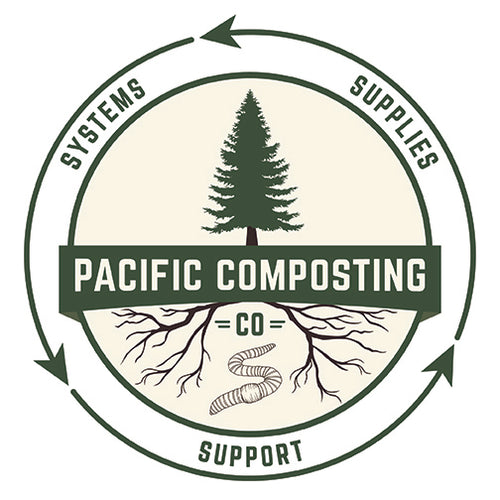
One such problem that can come up from time to time is a foul smelling bin.
Maybe it smells like swamp gas,
Maybe it smells like rotting vegetables,
Maybe it’s just some sort of smell you can’t describe with any words other than “nasty”.
Whatever it smells like, you will know when something isn’t working well in your bin.
A well-maintained worm bin should smell like rich soil after a rainfall, or nothing really at all. If you are getting some extra-funky odours when you open your bin or, even worse, when you walk in the room...something needs to be done!
Here are some of the potential culprits of a smelly bin situation:
-
Too much moisture - All that extra moisture can lead to anaerobic conditions, since water can only hold a fraction of the oxygen that air can (especially when that water is full of nutrients and microbes). Anaerobic pathways can lead to the production of foul-smelling compounds like methane and hydrogen sulfide, among others.
-
Too much food - When you add more food than the worms can process within a reasonable time frame, it tends to rot and create bad odours, especially water-rich kitchen scraps (see “too much moisture” above).
-
Not enough air flow - Poor airflow contributes to anaerobic pockets, and it also means less bad-odour-causing gas can escape from the system. The worms are surprisingly tolerant of these low-oxygen conditions (so you don’t need to worry so much about killing them), but the bad smells and ineffectiveness of the process (which only really works when aerobic) should be more than enough motivation to make things right.
- Certain kinds of wastes - Certain types of foods just smell more than others. e.g. members of the Brassicaceae family (cabbages, cauliflower, kale etc) release sulfur compounds when they break down, making it even more likely you’ll catch some funky whiffs when you are adding them regularly, even in cases where a bin is fairly well managed.
What’s great about stinky worm bins is that there are some easy (and often fairly “fast”) solutions, unlike some of the other challenges encountered as a new vermicomposter!
Let’s now take a look at some of the best stinky bin remedies.
-
Boost Airflow
The key with airflow is to provide enough oxygenation, while still maintaining really nice, moist conditions. This is sometimes easier said than done. If you are using a plastic bin system - especially a DIY plastic worm bin, increasing aeration is a simple matter of adding more air holes. With other systems, you may want to leave your lids off/open for part of the day (ideally during daylight hours). Airflow can be improved inside your bins as well, simply by mixing in bulky bedding materials and/or lightly “fluffing” up your habitat materials periodically (the PC Worm Rake is great for this).
-
Cut Back on Feeding
Forget the silly claims about worms "eating their weight in wastes per day" and instead focus on feeding in moderation, and letting the worms (more specifically, their feeding habits) be your guide. A good rule of thumb to aim for initially is ¼ the weight of your worms in food scraps added twice a week (so ½ their weight per week), and then increase over time as your population grows. If too much food caused your stinky bin in the first place, we also recommend removing excess food from your system (this could be placed in a bag and frozen temporarily, or could simply be added to an outdoor system).
-
Add Living Materials
LMs are microbe-loaded materials that can act like biofilters, helping to absorb various gases that cause bad odors, and converting them into more nose-friendly compounds. They can also greatly boost your population of beneficial decomposer microbes, which can improve the composting efficiency of the system. Be sure to check out our living materials article if you are new to the concept!
-
Add More Bedding
Absorbent, bulky bedding materials can soak up excess moisture and help improve airflow, both of which can help to reduce smelly anaerobic zones in your bins. Shredded (or hand-ripped) cardboard is a great choice, but there are a variety of options. Be sure to check out our bedding article to learn more.
-
Optimize Your Food Materials
Anything you can do to make your food materials more microbe-ready can greatly assist the worms, and ultimately the process as a whole! Various forms of chopping/grinding of fruit/veggie scraps can help with breaking down physical defenses and greatly increases the surface area for microbial colonization. Mixing your optimized materials with living material can help to ensure that microbes are able to start the breakdown process that much more quickly and easily.
Wrapping Up
It’s easy to assume we’ve really messed up when our bins smell more “rotten” than “rich”, but the good news is that stinky systems happen to the best of us, they usually aren’t something you need to panic about, and they are relatively easy to fix.The key with a smelly system - especially one you can smell from across the room - is always to put your vermicomposting activities on “pause”, and (depending on the cause) put one or more of the above suggestions into action as soon as you can.
Most issues relate in some way to moisture content and airflow! Once you master these, your vermicomposting efforts as a whole will likely feel a whole lot easier!
Helpful Related Resources
How to Feed Your Worms to Get The Best Results From Your Worm Bin
Living Materials
Bedding - The Most Important Material in Your Worm Bin?
DIY Plastic Worm Composting Bins

